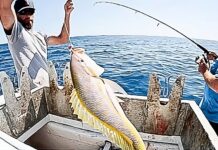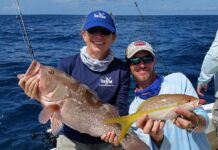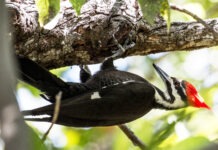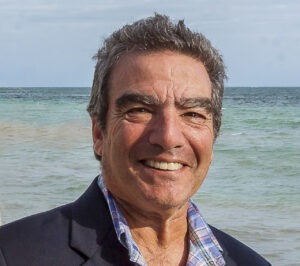Marathon’s Rachel Bowman was personally recruited to take a spot on the “Florida Man” team for this past weekend’s Emerald Coast Open, formerly the Lionfish World Tournament.
“I was the Florida Ma’am of the Florida Man team,” Bowman said, laughing. She joined brothers Joe and Josh Livingston of Destin, Florida, and John McCain of High Springs, Florida so they could re-create their win of 2018.
She replaced Alex Fogg, who stepped down to run the tournament, the biggest of its kind. Bowman and her team collected 2,241 fish on 87 dives in two days to win.
“The tournament is good for the environment, and good for tourism in our area,” said Fogg, who describes his full-time job as part marine research and part tourism cheerleader, under the auspices of Okaloosa County. This is the fourth year of the tournament and it attracted 187 divers from seven states. Divers netted almost 20,000 lionfish, big and small.
“This was a really successful year,” he said.
“These are really big numbers,” said Bowman. “This is unheard of.”
The tournament had two parts. The first was a four-month long collection of lionfish so local restaurants would have enough of the fish to serve divers attending the tournament. That was about 5,000 fish. And then the two-day tournament brought in the other 14,000 fish. All of those fish were sold to Whole Foods, and divers were compensated $4 a pound for small lionfish, and $6.25 for big fish.
So, is it working? Are humans able to stop or slow the lionfish invasion?
“I think humans have made a small dent in the situation,” Fogg said, “but there are other things in play. Nature has a tendency to figure this out.”
He said divers in the panhandle used to average 50 fish a dive; now the number is lower, sometimes in the single digits. Fogg attributes the decline in lionfish to a number of factors — Hurricane Michael, red tide, and perhaps some unknown pathogen. While the lionfish had no known predators in U.S. and Caribbean waters, they may be susceptible to a disease that leaves native populations untouched.
Still, Fogg said, the lionfish fight isn’t over. Tournaments like the Emerald Coast Open are important because they remove lionfish from the waters and continue to raise awareness.
Bowman is very committed to the cause.
“Tournaments get won because of extremely hard work, but none of this would have been possible without the amazing support of our family, friends, colleagues and employers,” she said. “The sponsorship of Keys Fisheries and Dive Rite, a scuba company out of Lake City, is also very important.”
Lionfish are the scourge of the seas. Although native to the tropical waters of the South Pacific, the venomous (not poisonous!) fish found its way to the U.S. about two decades ago, where there are no natural predators to this fast-reproducing and voracious fish. More than 120 different prey fish have been found in the bellies of the beast, and they can eat other fish that are as big as half their size. Snapper, grouper, the ornamental parrotfish and even baby lobster are no match for this fish, found in abundance in the Florida Keys. Even more terrifying: a female lionfish can lay 5 million eggs in one year.


















